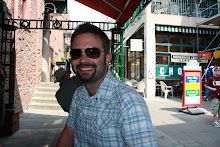
I've finished with the book, but the story won't end for a long while. I would be lucky to ever in my life pen a single page of a story so eloquently told as that of the story of Valentino Achak Deng in "What is the What." There are not many opportunities in ones life to read or hear a story of such life-affirming compassion, bravery, truthfullness and humor. It is astounding to me that a person can live through such adversity, see the amount of violence and death as Valentino saw in his childhood and still emerge a humorous, trusting, and compassionate adult who only wants to create a stable life for himself in the United States.
After being driven from his home in Southern Sudan by government soldiers and arab raiders, then chased again from a refugee camp in Ethiopia by rebel forces, and finally settling in a dusty, inhospitable camp in Kenya, he manages to create hope for himself in the midst of it all. No matter where he was or what he was running from, there was always a hope, no matter how naive, that wherever he was going was going to be different, was going to be better. And he always preserved the hope that he would one day return home to his family, even if he had no idea they were still alive. After spending nearly a decade in Kenya he was relocated to the US with thousands of other Lost Boys, to learn how to find his way in a new and completely unkown and terrifying world.
If anything, Valentino's story has shown me that above all else, after life's struggles and tribulations, that no matter what difficulties we face in life, we must always have compassion for one another, a sense of humor and a love of life. One of the last lines of the novel, one that will always stay with me because of the love that still manages to shine in Valentino's heart, says: "It gives me strength, almost unbelievable strength to know that you are there. I covet your eyes, your ears, the collapsible space between us. How blessed are we to have each other?" We are each of us very blessed, Valentino. Thank you.
P.S. If anyone is interested in learning more about Valentino Achak Deng, his foundation, and his work to improve the lives of his fellow countrymen both here and at home in Southern Sudan, please visit www.valentinoachakdeng.com
All proceeds from the sale of "What is the What" go to the Valentino Achak Deng Foundation, so please, buy the book!!







